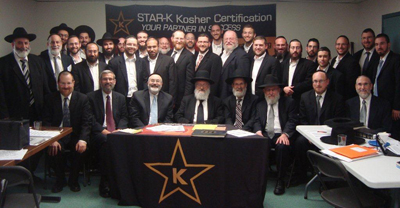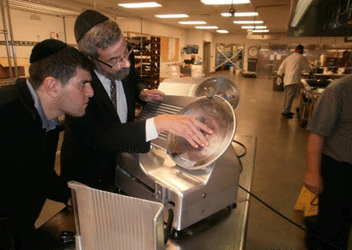Click here to view the listing of stores where chometz may be purchased after Pesach 2016
FOR MORE INFORMATION INCLUDING THE HALACHOS REGARDING PURCHASING CHOMETZ AFTER PESACH CLICK HERE:

Click here to view the listing of stores where chometz may be purchased after Pesach 2016
FOR MORE INFORMATION INCLUDING THE HALACHOS REGARDING PURCHASING CHOMETZ AFTER PESACH CLICK HERE:

Updated April 2024
As Pesach nears, the grocery bills mount and the bank account dwindles, the Jewish housewife courageously attempts to hold the household budget intact without compromising her strict standard of Pesach kashrus. She asks: Are there products in the marketplace that live up to their claims of fresh, pure, natural, or additive-free that can be purchased worry-free without special Passover certification, or are there legitimate kashrus concerns that would require the product to carry reliable Kosher for Passover (KFP) certification? Let us take a behind-the-scenes look at some of these potential products.
Supermarket Produce
Can the Passover consumer confidently purchase fresh fruits and vegetables without worrying about the wax coatings used to maintain the freshness of the fresh fruit and vegetables? Our research of food grade waxes has shown that soy proteins may be used as a thickener in some waxes. This means that the waxes may contain kitniyos derivative. However, […]

Spring 2009 | Reviewed February 2025
Q: There is a bracha which is recited once a year upon seeing a newly flowering fruit-bearing tree. I have a number of questions regarding Birchas Ha’ilonos:
When is the optimal time to say this bracha? Does the bracha have to be said during the month of Nisan?
What rules apply concerning the location of the person when saying the bracha? How far away can you be from the tree when saying the bracha? Can you be inside a house or other structure? Can you be in a car? Is it necessary to be at a site where there is more than one tree?
What limitations are there regarding the type of tree over which this bracha may be recited? Does the tree need to be fruit bearing? How old should the tree be? Can the tree be […]


If WE Can Do It, So Can You!!
Naomi Lazerow
I was raised in a home where I was told, “you’re Jewish.” That was the extent of my Jewish education. On the Jewish holidays, we went to my grandmother’s and ate the appropriate foods. On Passover we ate matzah but didn’t have a seder. My mother, a widow with four small children – my three younger brothers and me – lived in a non-Jewish neighborhood in Baltimore. We stood out as different, even though we didn’t really know what made us different. My husband Carl was raised in a very assimilated family and attended a large Reform Temple. Needless to say, when we married, we never would have predicted we’d have a kosher home some day.

Adapted from: On Judaism: Conversations on being Jewish in Today’s World, by Rabbi Emanuel Feldman, pages 219-236. With permission from Artscroll/Mesorah Publications, Ltd.
From the first man and woman we learn about the significance of eating. Adam and Eve were given simple, clear instructions. As guardians of the Garden of Eden they were permitted to taste everything in the Garden. There was only one restriction: they could not eat from one particular tree. If they did, they would die. Isn’t it curious that the Creator’s first conversation with Adam and Eve focuses on the do’s and don’t about food. Superficially, there is nothing about these instructions that strikes one as having implications for eternity or immortality. Just – this you may eat, that you must avoid.

It’s one thing to keep kosher; it’s quite another thing to stay kosher! Kashrus mix-ups are inevitable, even in the most scrupulous of kosher homes. So, when in doubt about a mix-up, don’t feel bad or embarrassed about asking a shaila (question in Jewish Law) of a Rav (Orthodox rabbi) or kashrus organization.

Healthy food choices and dieting are 21st century buzzwords. It seems that more than ever people are making positive dietary changes. For thousands of years, Judaism has offered a dietary blueprint. Not only does the Torah guide us in our food choices, it commands us to separate dairy and meat, and wait a customary length of time between eating meat and dairy dishes. Today, we find Jews of all ages and backgrounds with a growing interest in kashrus and kosher homemaking. For first-hand accounts of people who have kashered their homes click here.

In keeping with Star-K’s commitment to providing prompt, efficient service, Star-K companies will now have the option of receiving their Letter of Certification (LOC) electronically. This enhancement is especially useful for companies that send multiple LOC’s to each of their customers. For example, rather than faxing a five-page LOC to a long list of customers, Star-K companies will be only a click away from electronic LOC distribution. All their customers can receive the data they need in seconds.
Definitions
The Jewish religion incorporates within its tenets a regimen of dietary laws. These laws determine which food is acceptable and in conformity with Jewish Law. The word kosher is an adaptation of the Hebrew word meaning fit or proper. It refers to foodstuffs that meet the dietary requirements of Jewish Law.

How does one determine the level of acceptability of a certification?
The best way to begin is by asking your customers, distributors, or companies selling products similar to yours, about their experiences with a particular certification.

Is a kosher caterer’s non-Jewish chef allowed to squeeze the juice of fresh grapes into the food he is preparing for an event? Questions such as these, and more, were answered by HaRav Moshe Heinemann, shlit’a, at STAR-K Kosher Certification’s back-to-back seminars, held in their home offices, earlier this month. Participants joined the Foodservice Kashrus Training Seminar, July 1-3, and the Tenth Annual Kashrus Training Program, July 8-11, from across the US, Mexico, and Canada.
Rabbi Yechiel Biberfeld, who has been the Rosh Kollel of the Philadelphia Community Kollel for 13 years, attended the Tenth Annual Kashrus Training program so he could see and hear, first hand, the behind-the-scenes in Kashrus.
“I would like to see the standards of kashrus in our community be even better than they are already,” said Rabbi Biberfeld. “The information and insight from the STAR-K seminar will be helpful in attaining this goal. It gives you […]

July 1-3, 2013

It is also imperative that you make inquiries regarding the level of expertise and knowledge that the various agencies have about your particular industry. For example, if you are producing a food chemical such as citric acid or an amino acid, be sure that the Rabbi making the initial plant visit is familiar with industrial fermentations. Otherwise, his lack of understanding will almost certainly interfere with a smooth trouble-free certification.

Negotiating terms
One issue which may not be so obvious when first negotiating terms of kosher certification, but may be a very serious concern later on, is your need to know in advance if your raw ingredient suppliers will require kosher certification. If they do, will their present certification which they may already have, be acceptable? Although in most instances reputable agencies accept the certifications of other reputable agencies, there are a disturbing number of exceptions to this rule.

How do you go about selecting the right kosher certification that will satisfy your company’s particular needs?
Unless you are a local retail establishment whose kosher certification needs are best satisfied by the local rabbinical council, you are about to undergo a bewildering journey of trying to compare the merits of several different certifications. All kosher certification organizations are not identical!

In keeping with Star-K’s commitment to providing prompt, efficient service, Star-K companies will now have the option of receiving their Letter of Certification (LOC) electronically. This enhancement is especially useful for companies that send multiple LOC’s to each of their customers. For example, rather than faxing a five-page LOC to a long list of customers, Star-K companies will be only a click away from electronic LOC distribution. All their customers can receive the data they need in seconds.
Furthermore, because the LOC is in a “read only” Adobe file, security is assured. (Adobe Acrobat Reader is a commonly used program, easily downloaded from the internet.) An electronic LOC helps maintain the integrity of important information such as, “kosher for Passover” certification, or “when bearing the Star-K symbol”. This is most beneficial for kosher certification agencies.
This most recent change represents Star-K’s ongoing effort to maintain a state-of-the-art computer system in order to […]


Published Winter 2013
A Halachic Guide for the Delayed Friday Afternoon Traveler
Every few months, the phone rings on Erev Shabbos with a similar shayla: “We are not sure if we will reach our destination in time for Shabbos. What should we do?” If the call comes from people who are stuck in traffic, my response has been, “Are you calling to find out the halachos, or to hear the best alternate routes to reach your destination?”

Rabbinic alumni from Yeshiva University’s Rabbi Isaac Elchanan Theological Seminary (RIETS) visited STAR-K Kosher Certification’s offices, during their Yarchei Kallah, held in Baltimore, Maryland, April 22-24. Participants traveled from as far away as Edmonton, Alberta, Canada, and Oakland, California, for this annual event for American and Canadian Rabbonim, coordinated by Rabbi Jacob J. Schacter, University Professor of Jewish History and Jewish Thought and Senior Scholar at Yeshiva University Center for the Jewish Future.

Over the summer, STAR-K’s Baltimore offices hosted two Mashgichim Review Seminars which were attended by close to 50 mashgichim. The participants, who act in a kashrus supervisory capacity primarily for restaurants, caterers, camps, and college campus Kosher programs, came from throughout the Maryland-Pennsylvania region.


Rabbi Tzvi Rosen, Star-K Kashrus Administrator; Editor, Kashrus Kurrents
The Star-K Hotline is constantly abuzz with kashrus inquiries. Over 13,100 consumer calls were logged during the week before Pesach 5772. Questions ranged from product information to complex kitchen shailos , from reliable kosher airline caterers to wines whose kosher certification symbols are so small you need a high powered magnifying glass to read the rav hamachshir ’s name.
Published Spring 2009
Updated Fall 2018
A person visiting a hospital patient is performing the great mitzvah of bikur cholim . It is one of the mitzvos for which a person reaps benefits in this world, while the principal reward is saved for the next world. While visiting the sick, some halachic issues may arise. This article addresses these issues from the visitor’s point of view. Questions affecting the patient (such as adjusting the bed, using the call button, and asking the staff to perform tasks on Shabbos ) are important issues that should be posed to one’s rabbi.

Rabbi Daniel Presman traveled 10,800 roundtrip miles, a 22-hour roundtrip flight from his hometown of Porto Alegre, Brazil, just to attend STAR-K’s ninth annual Kashrus Training Program, July 16-19, held in its Baltimore offices. Hearing about the program via an email, he was convinced that it would be well worth the trip– he was not disappointed.

The field of Kashrus is diverse and multi-faceted. These attributes are mirrored in the multi-talented, eclectic STAR-K Kosher Certification’s Kashrus Administrators, who recently took Kashrus on the road to audiences in Baltimore, Lakewood, North Miami Beach, and Oak Park, Michigan. Their topics spanned everything from Astronomy to Kosher Organic Certification.

It should have come as no surprise when the Philippine Department of Agriculture sponsored the first official Philippine Pavilion at last month’s Kosherfest 2012, which included manufacturers of Kosher-certified products derived from coconuts, bananas and processed mangoes. Consul General Mario L. de Leon Jr., of the Philippine Consulate General New York, cut the ribbon at the pavilion and spoke at the Interest Session provided by Kosherfest organizers. The way was paved for Filipino exporters of processed food to explore the lucrative niche market of Kosher-certified food products.

A Supreme Effort for Kashrus
I doubt if any of the 3000 plus attendees at the 2012 Jewish Federations of North America’s General Assembly (GA) had as great an appreciation as I, of the efforts made to ensure the food they ate met the fod service industry’s highest kosher standards.

It’s a busy Friday afternoon, with just a couple of hours left until Shabbos. Not the best time, perhaps, for your husband to be unsure about the kashrus status of the chicken you are about to cook! You try contacting your Rav, but to your great dismay, he is unavailable.

Bob Vosburgh, Jeff Wells and Alyssa Haak
It’s tough enough getting certified on a single attribute, much less three. But Hain-Celestial Group’s WestSoy product line was able to gain organic, kosher and non-GMO certification in record time thanks to the emergence of multiple audit programs that streamline the verification process.